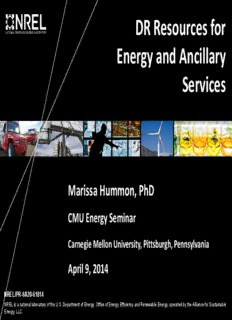
DR Resources for Energy and Ancillary Services PDF
Preview DR Resources for Energy and Ancillary Services
DR Resources for Energy and Ancillary Services Marissa Hummon, PhD CMU Energy Seminar Carnegie Mellon University, Pittsburgh, Pennsylvania April 9, 2014 NREL/PR-6A20-61814 NREL is a national laboratory of the U.S. Department of Energy, Office of Energy Efficiency and Renewable Energy, operated by the Alliance for Sustainable Energy, LLC. Outline • Background on the study • Assessing the capabilities of load to provide DR • Potential of DR to provide reserves Correlation of DR, reserve requirement, and reserve o price • Modeling DR in Production Cost Model What did we model? o Value of DR in Test System o Revenue Streams for DR o 2 Demand response and energy storage integration study Potential for flexible response from end-use appliances, equipment, and systems across the commercial, industrial, and residential sectors Operational values for flexible response and energy storage providing bulk power system services under different system conditions Energy transactions (e.g. use lower cost off-peak power to serve on-peak load) Provision of ancillary services (including frequency regulation, load following reserve, and contingency reserve) Reduction of generator unit starts, cycling, and ramping costs Change in values (increase or decrease) with increased penetration of variable renewable generation like wind and solar power Implementation barriers to the utilization of flexible response and storage 3 Project Team Department of Energy Ookie Ma Lawrence Berkeley National Laboratory Sila Kiliccote, Nance Matson, Daniel Olsen, Cody Rose, Michael Sohn, Sasank Goli, and June Dudley Peter Cappers and Jason MacDonald National Renewable Energy Laboratory Paul Denholm, Marissa Hummon, Jennie Jorgenson, and David Palchak Oak Ridge National Laboratory Michael Starke, Nasr Alkadi, and Ron Dizy (ENBALA) Sandia National Laboratories Dhruv Bhatnagar, Aileen Beth Currier, and Ray Byrne External advisors: Brendan Kirby and Mark O’Malley (UCD) 4 Assessment of Load to Provide Demand Response: – End uses – Grid services – Sheddability, Acceptability, Controllability End-Uses Selected for Participation • Commercial – Space Cooling, Space Heating, Lighting, Ventilation • Residential – Space Cooling, Space Heating, Water Heating • Municipal – Freshwater Pumping, Highway Lighting, Wastewater Pumping • Industrial – Agricultural Irrigation Pumping, Data Centers, Refrigerated Warehouses 6 DR services provided by End-Uses Product Purpose Response Characteristics Regulation Response to random unscheduled Called continuously, must begin response deviations in scheduled net load w/in 30 seconds, energy neutral over 15 minutes Flexibility Additional load following reserve for Called continuously, must begin response large un-forecasted wind/solar ramps w/in 5 minutes Contingency Rapid and immediate response to a loss Called once per day or less, must begin in supply (≤ 30 minutes) response w/in 1 minute Energy Shed or shift energy consumption over Called 1-2 times per day, 4-8 hours time (≥ 1 hour) advance notification Capacity Ability to serve as an alternative to Must be available top 20 hours in each generation area 7 Quantifying Responding Load Total balancing authority load Load from selected end-uses Portion of end-use loads which can be shed/shifted in typical “ ” DR Strategies ( sheddable load) Portion of sheddable load willing and able to participate Flexibility (Load is controllable, sheds/shifts are acceptable to end- Filters users) Portion of sheddable, controllable, acceptable load provisioned by PLEXOS 8 8 Summary of Results Product Estimated Availability Technical Potential* (% relative to total load) (% relative to total load) Regulation 153-1,822 MW (0.2-2.0%) 3,954-23,906 MW (6-20%) Flexibility 339-2,162 MW (0.4-2.3%) 3,954-23,906 MW (6-20%) Contingency 445-2,990 MW (0.5-2.8%) 5,156-26,712 MW (7-22%) Energy Shift 194-2,846 MW (0.2-2.3%) 2,185-25,592 MW (2-21%) Capacity 679-4,233 MW (0.8-3.5%) 5,390-32,353 MW (7-27%) *Technical Potential is sheddable load, with 100% controllability and acceptability 9 9 Footer 10 10
Description: